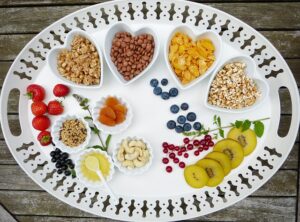Vitamin B Deficiency in Children: Symptoms, Risks, and Prevention
A balanced diet with essential vitamins is crucial for children’s growth and development, and the B vitamins play an important role in supporting this process. Vitamin B deficiency can impact various aspects of a child’s health, from energy levels to neurological development, and may have lasting effects if not addressed. This article explains the consequences of vitamin B deficiency in children, the symptoms associated with different types of B vitamin deficiencies, and ways to prevent them.
What Is Vitamin B Deficiency?
Vitamin B deficiency occurs when there isn’t enough of one or more types of B vitamins in the body. These vitamins are water-soluble, meaning they’re not stored for long in the body and must be consumed regularly through diet. Vitamin B includes eight different vitamins, each with its specific functions:
- Vitamin B1 (Thiamine)
- Vitamin B2 (Riboflavin)
- Vitamin B3 (Niacin)
- Vitamin B5 (Pantothenic Acid)
- Vitamin B6 (Pyridoxine)
- Vitamin B7 (Biotin)
- Vitamin B9 (Folate)
- Vitamin B12 (Cobalamin)
Each type plays a unique role, including converting food into energy, supporting healthy skin and eyes, boosting the immune system, and promoting healthy brain function. Since they can’t be stored in the body, a deficiency in any B vitamin can lead to specific symptoms and health risks.
Signs and Symptoms of Vitamin B Deficiency in Children
A vitamin B deficiency in children can manifest in different ways depending on which specific B vitamin is lacking:
Vitamin B1 (Thiamine) Deficiency
Thiamine is vital for nerve and muscle function and helps the body convert carbohydrates into energy. In children, a lack of vitamin B1 can lead to:
- Poor appetite
- Digestive issues
- Delayed growth and development
- Neurological issues, such as muscle weakness and numbness
Vitamin B2 (Riboflavin) Deficiency
Riboflavin aids in red blood cell production and helps convert food into energy. Deficiency symptoms include:
- Angular stomatitis (cracks at the corners of the mouth)
- Dry, cracked lips
- Sore throat
- Sensitivity to light and eye strain
Vitamin B3 (Niacin) Deficiency
Niacin is essential for digestion, skin health, and neurological development. A lack of B3 can lead to a condition called pellagra, which presents as:
- Skin rashes and dermatitis
- Digestive issues, such as diarrhea
- Fatigue and irritability
- Cognitive problems like confusion
Vitamin B5 (Pantothenic Acid) Deficiency
Though rare, a deficiency in vitamin B5 may cause:
- Fatigue
- Mood disturbances
- Muscle cramps and digestive issues
Vitamin B6 (Pyridoxine) Deficiency
Pyridoxine is important for brain development and immune function. In infants, a deficiency in vitamin B6 may lead to:
- Nervousness and irritability
- Increased excitability and convulsions
- Delayed growth and intellectual dullness in more severe cases
Older children may experience symptoms like mood swings, irritability, and issues with memory and concentration.
Vitamin B7 (Biotin) Deficiency
Biotin supports skin, hair, and nail health. Symptoms of deficiency may include:
- Hair thinning or loss
- Skin rashes, especially around the eyes, nose, and mouth
- Brittle nails
- Neurological symptoms such as depression and lethargy
Vitamin B9 (Folate) Deficiency
Folate is crucial for DNA synthesis and cell growth. A lack of folate can lead to:
- Megaloblastic anemia, which causes fatigue and weakness
- Growth delays in children
- Poor immune function and increased risk of infections
Vitamin B12 (Cobalamin) Deficiency
Vitamin B12 is necessary for red blood cell formation and neurological function. Symptoms of deficiency in children may include:
- Pale skin and fatigue
- Loss of appetite
- Digestive issues, such as diarrhea
- Developmental delays and learning difficulties
In severe cases, it may cause megaloblastic anemia and nerve damage.
Health Risks Associated with Vitamin B Deficiency in Children
Vitamin B deficiencies can have both short-term and long-term health impacts on children, including:
- Impaired Cognitive Development: B vitamins, especially B1, B6, B9, and B12, play a role in brain function and cognitive development. A lack of these vitamins during childhood could lead to memory issues, learning difficulties, and impaired concentration.
- Growth Delays: Since many B vitamins are involved in cellular growth and energy production, a deficiency can result in slower physical growth and delayed milestones.
- Compromised Immune Function: Some B vitamins, like B6 and B9, are important for immune health. Children with deficiencies may be more susceptible to infections.
- Digestive Issues: Certain B vitamins (such as B3 and B6) support digestive health, and their deficiency can lead to poor digestion and nutrient absorption.
- Increased Fatigue and Weakness: B vitamins help in energy production. Without enough, children may feel tired and less active, impacting their school performance and social life.
Preventing Vitamin B Deficiency in Children
Ensuring children receive adequate vitamin B through a balanced diet is essential. Here’s how to incorporate vitamin B-rich foods into their diet:
- Vitamin B1 Sources: Whole grains, nuts, seeds, pork, and legumes.
- Vitamin B2 Sources: Dairy products, eggs, lean meats, and leafy green vegetables.
- Vitamin B3 Sources: Poultry, fish, peanuts, whole grains, and fortified cereals.
- Vitamin B5 Sources: Chicken, beef, eggs, whole grains, and avocados.
- Vitamin B6 Sources: Chickpeas, salmon, chicken, potatoes, and bananas.
- Vitamin B7 Sources: Eggs, nuts, seeds, and certain vegetables like sweet potatoes.
- Vitamin B9 Sources: Leafy greens, legumes, and citrus fruits.
- Vitamin B12 Sources: Meat, dairy products, fish, and fortified cereals.
Practical Tips for Parents
- Serve Balanced Meals: Aim to include a variety of food groups in every meal, focusing on protein, whole grains, and vegetables, which are good sources of different B vitamins.
- Incorporate Fortified Foods: Some cereals and breads are fortified with B vitamins, particularly B12, which is naturally found in animal products.
- Consult a Pediatrician: If you’re concerned about your child’s diet or think they might be deficient, speak to a healthcare provider. They may recommend blood tests or supplements if needed.
- Monitor Vegetarian or Vegan Diets: If your child follows a vegetarian or vegan diet, they may be at risk for B12 deficiency, as this vitamin is mostly found in animal products. Consider B12 supplements if recommended by a doctor.
- Limit Processed Foods: Highly processed foods may lack essential nutrients, so focus on whole foods that naturally contain vitamins.
Should Children Take Vitamin B Supplements?
While supplements can help, they should only be used if recommended by a healthcare provider, especially in children. Over-supplementing with B vitamins is generally safe since they are water-soluble, but certain high doses can lead to side effects like nausea, skin issues, or nerve damage in extreme cases.
Key Takeaways
B vitamins are essential for children’s physical and cognitive development. A deficiency in these vitamins can impact everything from energy levels to cognitive development, so ensuring a diet rich in various B vitamins is important for growing children. By providing a balanced diet and seeking professional advice when necessary, parents can help prevent deficiencies and support their child’s overall health and development.
FAQs
1. What are the signs of vitamin B deficiency in children?
Signs can include fatigue, poor growth, irritability, digestive issues, and cognitive difficulties, depending on which B vitamin is lacking.
2. Can vitamin B deficiencies impact a child's development?
Yes, a deficiency can lead to impaired cognitive function, delayed growth, and issues with concentration and memory.
3. How can I ensure my child gets enough vitamin B?
Ensure they eat a balanced diet with sources of B vitamins, such as whole grains, meats, dairy, and leafy vegetables.
4. Are vitamin B supplements necessary for children?
Supplements should only be used when recommended by a healthcare provider, especially in cases of diagnosed deficiency.
5. What foods are rich in vitamin B?
Foods like eggs, meats, dairy, whole grains, leafy greens, and fortified cereals are excellent sources of vitamin B.













